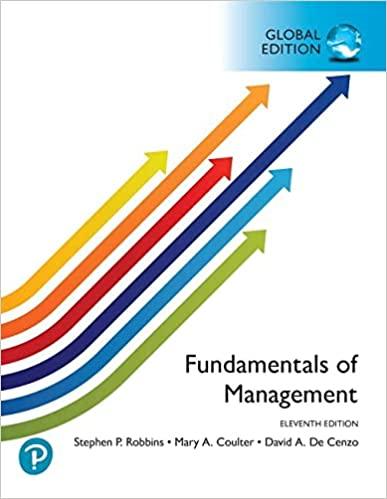In 1999, the United Kingdom introduced the National Minimum Wage, requiring employers to pay a minimum hourly
Question:
In 1999, the United Kingdom introduced the National Minimum Wage, requiring employers to pay a minimum hourly rate regardless of the size of the organization or the nature of the role. Reviewed by an independent body, this minimum rate has increased every year. The campaign for a living wage started in 2001 and was aimed at ensuring that wages were at levels that allowed workers to meet living costs,
not just the government minimum. The campaign gained crossparty support, and in 2016, the government introduced the National Living Wage for workers over 25.
Both these policies were intended to help workers maintain a basic standard of living, and organizations seen to be breaking the rules faced government investigation and, in rare cases, prosecution.76 With these legal requirements in place,
why are some companies choosing to pay more?
The Living Wage Foundation aims to persuade organizations to pay employees more than the legal mandate to help them to afford what they need for a decent standard of living,
which involves things like healthier food. At the beginning of January 2019, they had over 4,700 accredited living-wage employers, including a third of the FTSE 100.77 One of these companies, IKEA UK, introduced the real living wage in April 2016, leading to a wage increase for 7,300 workers. Pernille Hagild, IKEA UK’s Country HR Manager, said that the increase would help with the company’s plans for growth in the United Kingdom and that it would lead to increased motivation and reduced staff turnover. Employees were reported to have said the changes in their lives would be quite significant, allowing them to apply for mortgages, pay their bills, and simply enjoy life more.78 Chelsea FC became the first premiership football club to sign up to the living wage in 2014. Chelsea’s chairman, Bruce Buck, believed it showed a commitment to the staff, ensuring that hard work and dedication were rewarded fairly. It extended the hourly rate increase to include staff employed by external contractors at their training ground. The move was supported by the then Mayor of London, Boris Johnson, who felt this was a good example to set for the other clubs.79 The theme that this is simply the right thing to do is echoed by many of the accredited employers. Oxfam firmly believes that being able to work and earn a decent wage is fundamental to overcoming poverty. Nestlé see the commercial benefit, believing that being a Principal Partner of the Living Wage Foundation will help them influence the industry, but they also acknowledge that increased wages will have a positive impact on the wider community.
Has the move proved a success for Chelsea FC, IKEA,
and the other 4,700 employers? Research carried out by the Living Wage Foundation does appear to support the decision.
Surveying over 800 accredited real Living Wage businesses,
the Foundation found that over half had seen improvements in both recruitment and retention. For example, Brewdog, a manufacturer and retailer of craft beer, saw staff turnover fall by 40 percent in the year after they introduced the living wage. Of the 800 businesses surveyed, 57 percent had seen an increase in the commitment and motivation of living wage employees (rising to 78 percent for larger employers). In addition, 86 percent believed that the decision to pay the real living wage had also enhanced the organization’s reputation.
Discussion Questions
1. Does this case support the myth at the beginning of the chapter?
2. Do you think that the reported increase in motivation has to do with something apart from just the extra money?
3. Would these benefits to the organization be seen if middle or higher wage rates had been increased?
4. Do you see any long-term issues with this increase in wage levels?
Step by Step Answer:

Fundamentals Of Management
ISBN: 9781292307329
11th Global Edition
Authors: Stephen P. Robbins, Mary A. Coulter, David A. De Cenzo





